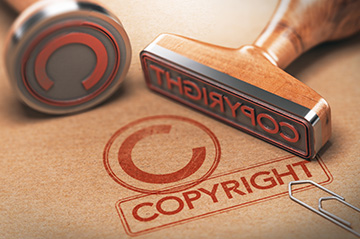 A Copyright protects an “original work of authorship,” such as a book, script, painting, photograph, song, video, computer software, fabric and furniture design or architecture from being copied without permission. Copyright protection naturally exists from the moment a “work” is created, but in the United States, a copyright may be registered with the United States Copyright Office, a division of the United States Library of Congress, once the work is fixed in a “tangible medium of expression.”
A Copyright protects an “original work of authorship,” such as a book, script, painting, photograph, song, video, computer software, fabric and furniture design or architecture from being copied without permission. Copyright protection naturally exists from the moment a “work” is created, but in the United States, a copyright may be registered with the United States Copyright Office, a division of the United States Library of Congress, once the work is fixed in a “tangible medium of expression.”
A copyright is infringed upon when an unauthorized person copies, licenses, distributes or adapts the protected work without permission. Copyright protection is provided by the laws of the United States, Title 17 of the United States Code. While registration is not required for protection, there are some significant advantages to registering your work with the United States Copyright Office. These advantages include public and legal notice of your ownership of the work. Upon registration, your work will be published in the Copyright Office’s catalog, a searchable database of registered copyrighted material. This provides the public with constructive notice that you own the work. Registration also provides prima facie (true on its face) evidence that the copyright is valid if the work is registered within five years of being made available to the public.
Perhaps the most advantageous reason to register your work is that without a registration, you cannot bring a lawsuit for copyright infringement. With a registration, you may be entitled to statutory damages and attorneys' fees of up to $150,000.00 per infringement, without having to prove actual damages, so long as the registration is within three months of the work's publication (made publicly available) or before the infringement occurs; thus, timely registration is critical. Without a timely registration, you are limited to actual damages in the case of infringement, which could be nominal and difficult to prove, at best.
The Copyright Application process is a fairly simple, inexpensive process. SHERMAN IP attorneys are available to assist you in filing your applications.

